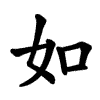Definify.com
Definition 2026
早
早
Translingual
| Stroke order | |||
|---|---|---|---|
| | |||
| Stroke order | |||
|---|---|---|---|

| |||
Han character
早 (radical 72 日+2, 6 strokes, cangjie input 日十 (AJ), four-corner 60400, composition ⿱日十)
Derived characters
References
- KangXi: page 489, character 12
- Dai Kanwa Jiten: character 13742
- Dae Jaweon: page 850, character 9
- Hanyu Da Zidian: volume 2, page 1483, character 6
- Unihan data for U+65E9
Chinese
|
simp. and trad. |
早 | |
|---|---|---|
Glyph origin
| Historical forms of the character 早
| ||
|---|---|---|
| Bronze inscriptions | Large seal script | Small seal script |
 |
 |
 |
| Characters in the same phonetic series (早) (Zhengzhang, 2003) | |
|---|---|
| Old Chinese | |
| 早 | *ʔsuːʔ |
| 草 | *sʰuːʔ |
| 愺 | *sʰuːʔ |
| 騲 | *sʰuːʔ |
| 皁 | *zuːʔ |
| 皂 | *zuːʔ |
One possibility is that 早 is a pictograph of sun (日) over the horizon. However, it is also possible that 早 was originally a pictograph of a particular type of acorn. The shells of these acorns would be used to make a dark-colored dye. This color indicated the darkness before sunrise and the symbol then took on the meaning of early or fast.
Pronunciation
- Mandarin
- Cantonese (Jyutping): zou2
- Hakka (Sixian, PFS): chó
- Min Dong (BUC): cā / cō̤
- Min Nan (POJ): chó͘ / chó / chá / chái
- Wu (Wiktionary): tsau (T2)
- Mandarin
- (Standard Chinese, Beijing)+
- Pinyin:
- Zhuyin: ㄗㄠˇ
- Wade-Giles: tsao3
- Gwoyeu Romatzyh: tzao
- IPA (key): /t͡sɑʊ̯²¹⁴/
-

- (Standard Chinese, Beijing)+
- Cantonese
- (Standard Cantonese, Guangzhou)+
- Jyutping: zou2
- Yale: jóu
- Cantonese Pinyin: dzou2
- IPA (key): /t͡sou̯³⁵/
- (Standard Cantonese, Guangzhou)+
- Hakka
- (Sixian, incl. Miaoli and Meinong)
- Pha̍k-fa-sṳ: chó
- Hakka Romanization System: zo`
- Hagfa Pinyim: zo3
- IPA: /t͡so³¹/
- (Sixian, incl. Miaoli and Meinong)
- Min Dong
- (Fuzhou)
- Bàng-uâ-cê: cā / cō̤
- IPA (key): /t͡sa³³/, /t͡so³³/
- Note: cā - vernacular; cō̤ - literary.
- (Fuzhou)
- Min Nan
- (Hokkien: Quanzhou)
- Pe̍h-ōe-jī: chó͘
- Tâi-lô: tsóo
- Phofsit Daibuun: zor
- IPA (Quanzhou): /t͡sɔ⁵⁵⁴/
- (Hokkien: Xiamen, Zhangzhou)
- Pe̍h-ōe-jī: chó
- Tâi-lô: tsó
- Phofsit Daibuun: zoir
- IPA (Xiamen): /t͡sɤ⁵³/
- IPA (Zhangzhou): /t͡sɤ⁵³/
- (Hokkien: Quanzhou, mainstream Taiwanese, Xiamen, Zhangzhou)
- Pe̍h-ōe-jī: chá
- Tâi-lô: tsá
- Phofsit Daibuun: zar
- IPA (Quanzhou): /t͡sa⁵⁵⁴/
- IPA (Taipei): /t͡sa⁵³/
- IPA (Kaohsiung): /t͡sa⁴¹/
- IPA (Xiamen): /t͡sa⁵³/
- IPA (Zhangzhou): /t͡sa⁵³/
- (Hokkien: Quanzhou, mainstream Taiwanese, Xiamen, Zhangzhou)
- Pe̍h-ōe-jī: chái
- Tâi-lô: tsái
- Phofsit Daibuun: zae
- IPA (Quanzhou): /t͡saɪ⁵⁵⁴/
- IPA (Taipei): /t͡saɪ⁵³/
- IPA (Kaohsiung): /t͡saɪ⁴¹/
- IPA (Xiamen): /t͡saɪ⁵³/
- IPA (Zhangzhou): /t͡saɪ⁵³/
- Note: chó͘/chó - literary; chá - vernacular; chái - vernacular (for certain words).
- (Hokkien: Quanzhou)
- Wu
- (Shanghainese)
- Wiktionary: tsau (T2)
- IPA (key): /t͡sɔ³⁴/
- (Shanghainese)
| Rime | |
|---|---|
| Character | 早 |
| Reading # | 1/1 |
| Initial (聲) | 精 (13) |
| Final (韻) | 豪 (89) |
| Tone (調) | Rising (X) |
| Openness (開合) | Open |
| Division (等) | I |
| Fanqie | 子晧切 |
| Reconstructions | |
| Zhengzhang Shangfang |
/t͡sɑuX/ |
| Pan Wuyun |
/t͡sɑuX/ |
| Shao Rongfen |
/t͡sɑuX/ |
| Edwin Pulleyblank |
/t͡sawX/ |
| Li Rong |
/t͡sɑuX/ |
| Wang Li |
/t͡sɑuX/ |
| Bernard Karlgren |
/t͡sɑuX/ |
| Expected Mandarin Reflex |
zǎo |
| Baxter-Sagart system 1.1 (2014) | |
|---|---|
| Character | 早 |
| Reading # | 1/1 |
| Modern Beijing (Pinyin) |
zǎo |
| Middle Chinese |
‹ tsawX › |
| Old Chinese |
/*Nə.tsˤuʔ/ |
| English | early |
Notes for Old Chinese notations in the Baxter-Sagart system: * Parentheses "()" indicate uncertain presence; | |
| Zhengzhang system (2003) | |
|---|---|
| Character | 早 |
| Reading # | 1/1 |
| No. | 16546 |
| Phonetic component |
早 |
| Rime group |
幽 |
| Rime subdivision |
1 |
| Corresponding MC rime |
早 |
| Old Chinese |
/*ʔsuːʔ/ |
Definitions
早
- early; in advance; soon
- long ago; for a long time
- (early) morning
- good morning
- before; in the past time
Compounds
Japanese
Kanji
Readings
Compounds
| Kanji in this term |
|---|
| 早 |
|
はや Grade: 1 |
| kun'yomi |
Pronunciation
Noun
早 (hiragana はや, romaji haya)
- already, now